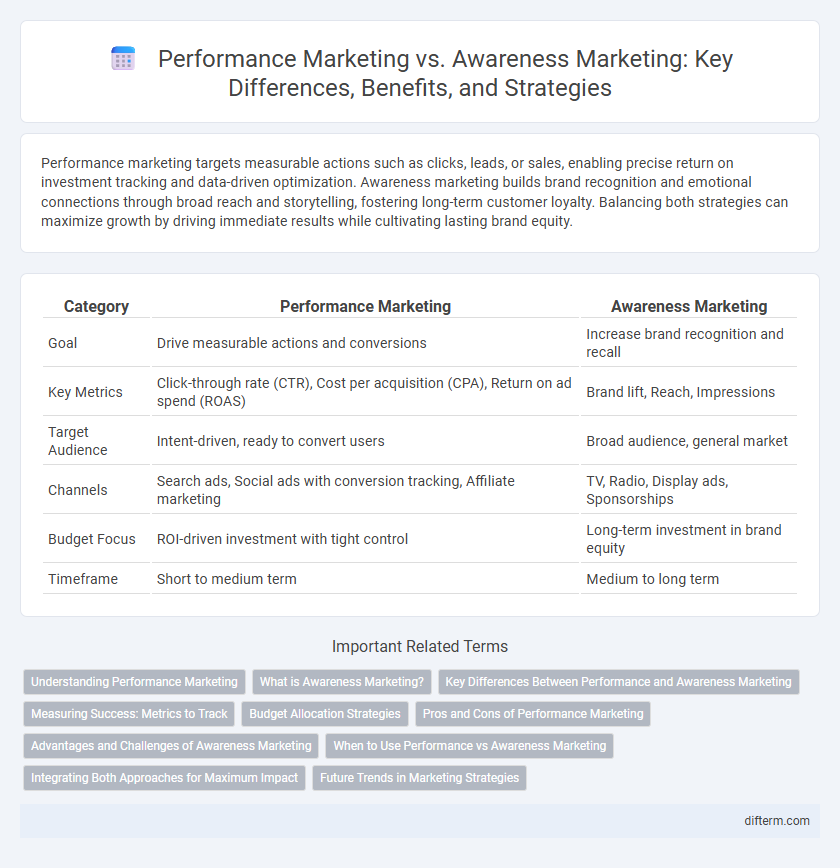Performance marketing targets measurable actions such as clicks, leads, or sales, enabling precise return on investment tracking and data-driven optimization. Awareness marketing builds brand recognition and emotional connections through broad reach and storytelling, fostering long-term customer loyalty. Balancing both strategies can maximize growth by driving immediate results while cultivating lasting brand equity.
Table of Comparison
| Category | Performance Marketing | Awareness Marketing |
|---|---|---|
| Goal | Drive measurable actions and conversions | Increase brand recognition and recall |
| Key Metrics | Click-through rate (CTR), Cost per acquisition (CPA), Return on ad spend (ROAS) | Brand lift, Reach, Impressions |
| Target Audience | Intent-driven, ready to convert users | Broad audience, general market |
| Channels | Search ads, Social ads with conversion tracking, Affiliate marketing | TV, Radio, Display ads, Sponsorships |
| Budget Focus | ROI-driven investment with tight control | Long-term investment in brand equity |
| Timeframe | Short to medium term | Medium to long term |
Understanding Performance Marketing
Performance marketing emphasizes measurable outcomes such as clicks, conversions, and sales, using data-driven strategies to optimize return on investment (ROI). It leverages tools like pay-per-click (PPC) campaigns, affiliate marketing, and programmatic advertising to directly link marketing spend with performance metrics. Understanding performance marketing enables businesses to allocate resources efficiently and scale campaigns based on real-time analytics and targeted audience behavior.
What is Awareness Marketing?
Awareness marketing focuses on building brand recognition and increasing consumer familiarity with a product or service by creating memorable and engaging content. It targets broad audiences through channels such as social media, TV ads, and influencer partnerships to generate interest and trust over time. The primary goal is to establish a strong brand presence that drives future consideration and loyalty.
Key Differences Between Performance and Awareness Marketing
Performance marketing focuses on measurable results such as clicks, conversions, and ROI, targeting immediate actions and sales. Awareness marketing prioritizes building brand recognition and long-term customer engagement through broad reach and emotional connection. Key differences include performance marketing's data-driven optimization and direct response focus versus awareness marketing's emphasis on storytelling and brand loyalty development.
Measuring Success: Metrics to Track
Performance marketing relies on quantifiable metrics such as cost per acquisition (CPA), return on ad spend (ROAS), and conversion rates to directly evaluate campaign success. Awareness marketing measures brand lift, reach, impressions, and engagement rates to assess its impact on consumer perception and long-term brand recognition. Combining metrics from both approaches provides a comprehensive view of marketing effectiveness and business growth.
Budget Allocation Strategies
Performance marketing focuses on measurable ROI, allocating budgets dynamically to channels like PPC, social media ads, and affiliate marketing based on conversion data. Awareness marketing invests heavily in brand-building tactics such as content marketing, influencer partnerships, and broad-reach media to enhance long-term customer engagement. Effective budget allocation balances short-term performance metrics with sustained brand visibility to optimize overall marketing impact.
Pros and Cons of Performance Marketing
Performance marketing offers precise tracking of return on investment (ROI) through measurable metrics like click-through rates and conversion rates, enabling data-driven budget allocation. It allows targeted campaigns tailored to specific audience segments, increasing efficiency and minimizing wasted ad spend. However, this approach may neglect broader brand-building objectives and often relies heavily on short-term results, which can limit long-term customer loyalty and brand awareness growth.
Advantages and Challenges of Awareness Marketing
Awareness marketing builds brand recognition and emotional connection, driving long-term customer loyalty, yet measuring its direct impact on sales remains challenging. It facilitates market penetration and expands audience reach but requires substantial investment and creative strategies to stand out in saturated markets. Despite difficulties in tracking ROI, awareness marketing lays the foundation for performance marketing success by nurturing trust and familiarity.
When to Use Performance vs Awareness Marketing
Performance marketing excels when businesses need measurable ROI and direct customer actions like clicks, leads, or sales, making it ideal for product launches or time-sensitive promotions. Awareness marketing is best used during brand-building phases, aiming to increase visibility and long-term consumer recognition across broad audiences through emotional engagement and storytelling. Choosing between performance and awareness marketing depends on campaign goals, budget allocation, and the desired impact on customer journey stages.
Integrating Both Approaches for Maximum Impact
Performance marketing drives measurable actions such as conversions and sales through targeted campaigns using data analytics and ROI tracking. Awareness marketing builds brand recognition and engagement by creating emotional connections and reaching broad audiences across multiple channels. Integrating both approaches leverages data-driven performance tactics while maintaining strong brand presence, maximizing customer acquisition and long-term loyalty.
Future Trends in Marketing Strategies
Performance marketing is increasingly driven by AI and data analytics, enabling hyper-targeted campaigns that deliver measurable ROI and real-time optimization. Awareness marketing is evolving through immersive technologies like AR and VR, enhancing brand engagement by creating memorable customer experiences. Future marketing strategies will blend these approaches, leveraging automation and personalization to balance immediate results with long-term brand loyalty.
Performance Marketing vs Awareness Marketing Infographic

 difterm.com
difterm.com